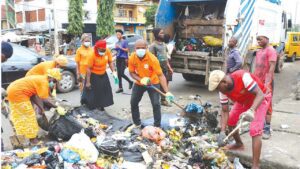
Tackling ecological threats of oil exploration against human habitat
Oil exploration in Nigeria has been a deep seated subject which has taken dimensionally rooted courses in the Country. While the discovery of oil has come with its benefits, it is inarguable that the exploration and development of sectoral activities around it has without doubt come with its disadvantages. Although, the era of oil boom had brought seasons of plenty, the discovery of oil and the exploration of same had certainly brought to play the neglect of other sectors in Country. It is indisputable that the neglect of other sectors following the preponderating concentration on oil and gas, particularly the overarching reliance of the Government on the proceeds of oil as the major source of revenue, has over the years left gaps of which the Country is now suffering the brunt of economic deficiencies.
However, while the neglect has brought strains on the economy with revenue shortfalls and currency devaluation, posing acute socio-economic constraints, the adverse effects of the exploration of oil in the Country transcend socio-economic impacts. Another potent adverse effect of the adventures has been the environmental impacts of exploration. It is known that resonating notations of the adverse effects on the ecological degradation of the habitat of oil communities have been a subject of contest over the years. Clamours by natives of communities where exploration has inflicted huge blow on the habitat has been a major source of conflict, which in itself has over time borne metabiotic impacts generating disturbing offshoots in the Country, particularly in the immediate Niger-Delta region where oil exploration is deep seated, and at large, the Country.
The destruction of land and water resources as well as the atmosphere with pollutants, have brought indigenes of these communities to pitiable conditions. The demands for amnesty by these natives appear not to be suffice enough to address the environmental impacts. It is clear that while some of these impacts may be difficult to avoid, it is not inarguable that there are some which are much avoidable. Ameliorating, curative and restorative efforts such as the Ogoni clean-up, are some of the efforts channeled towards cushioning the impacts of degeneration of habitats of oil communities to relief the inhabitants. The effects of oil exploration have further compounded with illicit misadventures such as pipeline vandalism posing threats on the ecology, health and social wellbeing of communities in project areas.
Last Monday, Minister of Environment, Dr Mohammad Abubakar, had disclosed that Nigeria recorded 4,919 oil spills between 2015 to March 2021 and lost 4.5 trillion barrels of oil to theft in four years. Abubakar who disclosed this at a Town Hall meeting in Abuja, organised by the Ministry of Information and Culture, on protecting oil and gas infrastructure had said that several statistics have emphasised Nigeria as the most notorious Country in the world for oil spills, loosing roughly 400,000 barrels per day. The minister had noted that the effects of the destruction of oil and gas facilities had caused huge economic losses from pipelines to plant shut downs, as well as loss of biodiversity, habitat and ecological damage. Moreover, the destruction had also caused degradation of soil quality, which drastically reduces soil fertility, thereby, affecting crop yields and food security, particularly in the affected region.
He was quoted: “According to the National Oil Spill Detection Agency (NOSDRA) data, the total number of oil spills recorded from 2015 to March 2021 is 4,919, the number of oil spills cost by collation is 308. The operational maintenance is 106, while sabotage is 3,628 and yet to be determined 70, giving the total number of oil spills on the environment to 235,206 barrels of oil. This is very colossal to the environment. Nigeria also lost approximately N4.75 trillion on oil activities in the four years between 2015 and 2018, as estimated by the Nigeria Natural Resources Charter.
“Several statistics have emphasised Nigeria as the most notorious country in the world for oil spills, loosing roughly 400,000 barrels per day. The second country is followed by Mexico that has reported only 5,000 to 10,000 barrel only per day, thus a difference of about 3,900 per cent. Now the environmental effect, which is the major concern of the ministry of environment, is in the loss of revenue. Attack on oil facilities has become the innovation that replaced agitations in the Niger Delta region against perceived poor governance and neglect of the area. The impacts of vandalism of oil facilities have not only caused pollution of the environment, but had consequences on the local people, the national economy and security. Also, increase in air pollution and the attendant climate change issues, public health impacts on affected communities, social impacts and loss of livelihood, supremacy among militants, casualties, among others.”
While efforts by the Government such as the Ogoni clean-up as well as monitoring and regulatory measures through the National Oil Spill Detection Agency (NOSDRA), can be reckoned with, and known to be pushing Oil Companies to take responsibility of remediation of degraded habitats, it is pertinent that much more measures need to be put in place to make them strongly responsive to avoid further deficiencies in operations which have made pollution such as oil spill pervasive. Hence, it is essential for the Government to strengthen policy measures towards checking the activities of oil exploration to mitigate, to the bearest minimum, operation gaps inimical to the environment, with threats to human habitat. Imperative is the significance of making the enforcement of relevant laws, regulations and guidelines, such as the Environmental Impact Assessment (EIA) Act, very stringent to direct the course of operators, particularly in the upstream subsector. More importantly, the need to create increasing awareness to develop orientation against the misadventures of vandalism of oil facilities and other illegal activities which preponderate the sector, and the negative consequences which these bear against human habitat is sacrosanct.



